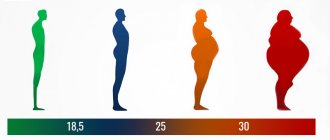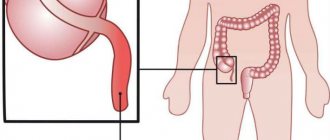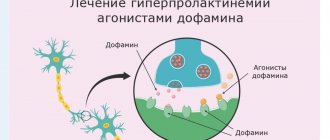Lack of weight is a pathological condition that is characterized by a decrease in body mass index below a critical level. It can develop in people of any age and gender and can be either an independent pathology or a symptom of other diseases. In critical cases, being underweight can lead to death.
Causes
- Diseases of the gastrointestinal tract, leading to impaired digestibility of food.
- Endocrine pathologies, which are characterized by disruptions in hormonal regulation. These include hyperthyroidism and adrenal insufficiency.
- Lifestyle features: poor nutrition, excessive physical activity, stress and lack of sleep.
- Psychological diseases: anorexia nervosa, panic attacks, etc.
- Oncological diseases. Weight loss can develop as a side effect of treatment, or as a result of the effect of the tumor on the body when cancer cachexia develops.
- In children, underweight may be due to intrauterine growth retardation, malnutrition, or incorrect selection of formula.
What are the dangers of losing weight in a cancer patient?
Cancer patients, regardless of the amount of food they eat and their physical activity, suffer from hypermetabolism (increased energy expenditure).
Lysis or destruction of deposits of sugars, proteins and fats causes a shortage of reserves, weakening the body in the fight against cancer, if this also causes difficulties with food. As a result, anorexia develops with decreased appetite and exhaustion. The following complications appear:
- fatigue (asthenia);
- anemia (decreased red blood cell levels);
- fluid retention and swelling;
- atrophy of muscle structures.
And these are not all the complications that worsen the quality of life of patients, increase inertia and dependence. Changes in appearance are fraught with deterioration of the psychosocial situation, complicate cancer treatment and worsen the prognosis of recovery.
Identifying patients at risk of malnutrition requires knowledge of tumor location, stage, treatment, intercurrent illnesses, and problems that impair nutritional intake. The following symptoms are taken into account:
- lack of appetite;
- fast saturation;
- difficulty swallowing;
- dry mouth and constipation;
- depression and anxiety.
Patients with advanced cancer and no active cancer treatment (palliative care phase) are, regardless of other factors, at high risk of malnutrition. This is observed primarily in cancers of the digestive tract, head, neck, lungs or ovaries.
There is a high risk of digestive problems and loss of appetite during chemotherapy (30-50% chance of symptoms with serious impact on nutrition). Immediate preventive measures are required to prevent toxic events, including vomiting, mucositis, diarrhea, and sensory changes that cause aversion to certain foods.
What types of cancer cause weight loss?
Losing body weight is not the first sign of cancer. This symptom develops in the later stages, when there is no longer any doubt about the progression of the malignant process in the body. In most cases, if a diagnosis has not been made for one reason or another, and the person has suddenly and significantly lost weight, we are talking about metastasis, and not about the initial stages of the development of the disease.
Weight loss for stomach or pancreatic cancer, in which 8 out of 10 patients develop cachexia. When this symptom appears, tumor operability is rare. With a malignant tumor of the lung, severe joint and muscle pain, as well as fever, accompany a sharp weight loss. In this case, weight loss is a secondary symptom.
Anorexia-cachexia syndrome is characterized by 4 symptoms:
- decrease in skeletal muscle mass;
- complete lack of appetite (anorexia);
- quick satiation with a small amount of food;
- constant unreasonable fatigue.
Weight loss within SACOB is typical for cancer of the uterus, prostate and lungs. In patients with malignant tumors of the mammary glands, it occurs in ¾ of cases. In the later stages of progression of the malignant process, anorexia-cachexia syndrome develops in all forms and types of cancer.
When treating malignant tumors, the patient has to lose weight repeatedly. Before surgery, appetite worsens due to stress. After surgery, you cannot eat the way you want. Because you need to adhere to a special diet. In this case, appetite is restored after 3-4 weeks and body weight returns to normal. With bowel cancer, weight loss takes longer, which is associated with a longer rehabilitation period.
A course of chemotherapy is accompanied by the development of adverse reactions such as nausea and vomiting, as well as damage to the mucous membranes of the gastrointestinal tract and oral cavity. During this period, patients have no time to eat at all. Drug-induced anorexia is characterized by severe suppression of appetite.
During radiation therapy for cancer of the mediastinal organs, breast and lung with areas of lymphatic drainage, nausea is also initiated due to damage to the mucous membranes of the esophagus. When exposed to the organs of the genitourinary system, the rectum and intestines are affected, which also leads to a deterioration in appetite. In this case, there is also a need to limit nutrition to reduce the number of bowel movements.
In the situations considered, body weight decreases by no more than 5% of the initial indicators and after the end of therapeutic manipulations, the index tends to increase. The main criterion for cancer cachexia or chemotherapy and radiation therapy is uninterrupted weight gain after completion of the procedures.
Sudden weight loss in men: when to sound the alarm
Anyone may experience the fact that their mass begins to rapidly decrease, although there were no prerequisites for this. There can be quite a few reasons, but not all of them indicate the presence of any diseases. Although the chances of such a development of events are also by no means minimal. Therefore, in order to protect yourself as much as possible, you should consult a doctor as soon as you discover strange symptoms.
First of all, you should find out what exactly can be considered truly dramatic weight loss. With a low initial weight, a loss of already 3% of weight should cause concern if you have not resorted to any diets or have not started exercising intensively. For people who are normal or overweight, acute weight loss can be considered a loss of 5% of total body weight in a short period of time.
How do experts figure it out?
When you contact your doctor, you will receive a list of tests that you will have to undergo to identify the cause of the abnormal “behavior” of your body. Typically, doctors initially ask a series of questions, the answers to which can be thought out in advance.
- Have you recently had any severe intoxication, poisoning, or suffered from vomiting, diarrhea or nausea?
- Have you had any problems with your teeth? With long-term treatment, or even more so, prosthetics, patients often completely lose their appetite, which is why they begin to rapidly lose weight.
- Has your appetite decreased or are you continuing to eat as before?
- There has been no significant stress in your life recently, are you experiencing symptoms of depression, increased nervousness, mild excitability, aggressiveness, irritability?
- How do you feel about alcohol, narcotic and psychotropic substances, do you smoke cigarettes?
- Are there any other health complaints other than sudden weight gain? Have you had any pain lately?
If positive answers predominate, then losing weight may depend not on internal, but on external problems affecting you. Then the solution will lie in the area of behavior correction, for example, quitting smoking. It doesn’t hurt to immediately tell your doctor if you take any medications, use dietary supplements, stimulants, herbal teas, or stimulants. Weight loss is a worrying factor, so it makes sense not to put it off, but to immediately consult a doctor, even if in general you feel quite well.
How much weight do cancer patients lose?
Losing more than 5% of body weight when no attempt is made to lose weight can be an early sign of cancer. Therefore, unexplained weight loss should not be ignored.
It is unclear what causes cancer wasting syndrome or cancer cachexia. It is assumed that malignant cells replicate exponentially* and consume energy during replication.
*replicate exponentially – increasing over time not only the value, but also the growth rate
Mental causes of lack of appetite in older people
Old people often lose weight due to lack of appetite. Reluctance to eat food is directly related to mental and emotional disorders. With retirement, many people feel unnecessary and lose their meaning in life. They often lack attention from loved ones, and this adds to the reasons for anxiety and worries.
If your relative does not receive enough attention from you, assign him to live in a private boarding house for the elderly. Here he will be surrounded by care and attention, which will help him get rid of depression and other disturbing thoughts. This will have a positive effect on appetite and will allow you to maintain normal body weight for the rest of your life.
How to stop losing weight and gain lost kilograms?
Cancer is one of the biggest threats to human life. In many cancers, sudden weight loss is one of the most dangerous manifestations. And this should be an urgent reason to visit a doctor.
The main problems of most cancer patients are related to the consumption of low amounts of protein and insufficient calories. Eating high-calorie and protein-rich foods is essential to provide energy to help the body fight disease.
Dietary recommendations for cancer:
- good sources of protein include lean meat, fish, poultry, nuts, dairy and/or soy products;
- To gain strength and feel better, patients are advised to take vitamins, minerals, and carbohydrates (fruits, vegetables and whole grains).
Not having enough of these nutrients can cause cancer patients to feel tired, weak, and less able to cope with treatment.
Even if the process of depletion of the body has already gone too far, doctors are faced with the task of maintaining the life of the patient and improving his condition. The measures taken are aimed at eliminating symptoms that negatively affect the supply of nutrients: damage to the mucous membranes, nausea and vomiting. Medicines are also prescribed to relieve pain and improve appetite.
Why are people more likely to become dehydrated as they age?
It is noted that as we age, many processes begin to take place in the human body that have been avoided for many years. Some of them can be treated with special medications prescribed by doctors. For other emerging problems, experts have not yet been able to find an appropriate effective solution. These include an increased likelihood of dehydration in old age.
According to scientific research, there are several reasons why a person’s risk of dehydration increases in old age. One of them is a kidney problem. Thus, experts have found that as we age, these organs begin to decrease in size. Also, after the age of 30, less blood begins to pass through them, and the kidneys filter it less well.
Over the years, the kidneys begin to remove waste products from the human body less efficiently. The consequence of this process is that the organs get rid of water faster and also process salts too little. This is what can cause dehydration in old age.
It is noted that another, no less important reason for dehydration in old age can be a decrease in the level of the hormone aldosterone, which is responsible for retaining salt, water, and some other substances in the body.
What can you do yourself?
One of the main goals when fighting cancer is weight maintenance, so proper nutrition is of utmost importance. When cachexia develops, it is necessary to increase the total intake of beneficial nutrients.
Regardless of the causes of malnutrition, cancer patients receive therapy to reduce the impact of treatment and side effects. The team of doctors, working closely with the patient, makes every effort to maintain weight in a healthy range. Medicines to treat nausea and vomiting and steroid medications to increase energy may also be prescribed.
However, each patient should take independent steps to maintain a healthy weight and build strength:
- Maintain a balanced diet
. You need to make sure you have enough protein in your diet. Consuming adequate amounts of protein can help maintain body weight. - Increase your calorie intake
. A cancer patient's body uses energy to fight cancer, so it makes sense to get more calories each day. - It is recommended to reduce portions, but increase the number of meals
per day. Instead of three meals a day, you can eat 5-6 times a day. - Increase fluid intake
. To prevent dehydration and increase energy at the same time, you should drink more fluids. These can be juices, broths, cocktails, etc. - Keep a diary
. Helps monitor the patient’s well-being after eating certain foods. It is also recommended to note any new side effects that may develop during treatment. Monitor fluid and medication intake. Clear information about these things will help develop a better strategy to fight cancer. - Include physical activity
. It is enough to take walks in the fresh air every day to activate your metabolism and strengthen your body.
Dietary recommendations for cancer patients are aimed at helping the patient cope with the consequences of the disease and speed up recovery. Dietary therapy helps you get enough calories to maintain a healthy weight, gain strength, and prevent tissue breakdown and infection.
MATERIAL PROBLEM
Many old people eat poorly. A small pension is not enough to buy good food. You have to save on everything, even on the grocery basket.
If your elderly relative needs financial assistance, if possible, help him solve this problem. It is not necessary to give cash; you can get by by buying food and delivering it to an elderly person at least once a week.
If your elderly relative is rapidly losing weight, look for the cause and take measures to solve this problem. Rapid weight loss can have dangerous health consequences. Consult your doctor and review the old man’s diet. If it is not possible to help an elderly relative on your own, send him to a private nursing home.
order a specialist consultation
What to do if you experience a sudden weight loss
Every fourth patient out of 20 patients with cancer dies from cancer cachexia. If you lose weight, it is recommended to immediately notify your doctor in order to take therapeutic measures aimed at correcting the patient’s condition. Take advantage of the services of oncologists with extensive practical experience who see you at the Medscan clinic in Moscow.
Our medical center uses a special approach to treating cancer patients, which differs from the generally accepted ones. To prevent unintentional weight loss, an early intervention strategy is used and a multidisciplinary approach is practiced. The attending physician works in a team with an oncopsychologist and nutritionist. An integrated approach is aimed at compensating the energy balance and maintaining a high quality of life for the patient.
About the syndrome
The problem we're looking at isn't just weight loss. In essence, this is a condition that is characterized by loss of muscle mass, but loss of fatty tissue is not at all necessary.
Muscle mass decreases due to anorexia and metabolic disorders.
This syndrome of patients with cancer is characterized by four symptoms:
- Loss of skeletal muscle mass;
- Anorexia;
- Saturation with small amounts of food;
- Fatigue.
This syndrome is characteristic of the last stage of cancer of the stomach and pancreas. It is also noted in patients with cancer of the lungs, colon and prostate gland (almost 50% of cases), in patients with breast cancer (approximately 1 case out of 4).
In principle, the syndrome can manifest itself in different types of cancer tumors. As a malignant neoplasm develops, it consumes more substances and needs more energy. The patient's appetite decreases and the digestive process is disrupted. Approximately a quarter of cancer patients die due to cachexia.
Body and energy
In a normal state, the body is a mechanism where there is a balance between energy consumed and energy expended. In this regard, unlike weight gain, weight loss is a phenomenon that requires special attention.
The fact is that weight gain is a natural state: nature is designed in such a way that the body consumes more substances than it expends. This is necessary from an insurance point of view.
If a person is on a diet or is sick, energy is consumed in a balanced manner and the first thing to be utilized is the reserves of subcutaneous fat. This is where everything you need comes from. When these reserves are depleted, the body's energy is taken from the fat of the internal peritoneal cavity. Then from organs containing fat cells.
Only after all this does the breakdown of muscle tissue proteins begin. First, the skeletal muscles are released, then the proteins contained in the organs.










